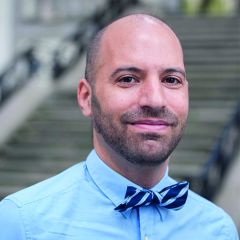History and Modern Languages
History and Modern Languages (HML) at Cambridge is a joint degree that gives you the opportunity to combine the study of languages, culture, and history.

Course overview
The History and Modern Languages (HML) course lasts four years. When you apply, you can choose to study a language from scratch (ab initio) or post-A Level or equivalent.
First year students take core language papers (including writing, translation, and oral skills), and a paper exploring cultural topics in your chosen language. On the historical side, you also take two history papers chosen from a broad variety covering different periods of European and world history and political thought. In second year, you continue to develop your language skills through further core papers, and combine these with a) a paper chosen from a wide range of literary, historical, cultural, or linguistic topics in your language area, b) a history paper, and c) a further specialist paper from either subject.
Your third year is spent abroad, either studying or working, and you will also work on a project relating to the culture, thought, history, or politics of your language area. Having spent the year immersed in your language, you then have an oral examination when you return from your year abroad. In your fourth and final year, you take five papers: two core language papers, a third paper on an area of culture or history related to your language, a history paper focusing on a particular period, region or theme, and a fifth paper that can be a specialist paper from either your language area or from history.
History and Modern Languages is taught at Cambridge by way of University-based lecture courses and College-based supervisions. The relationship between the two is co-ordinated by the College’s Director of Studies who arranges your supervisions each term and oversees your academic studies.
For more information about the course and its modules, visit the University website.
What is it like to study HML at King's?
King's is a friendly, culturally diverse and exciting place to study HML. We have a good number of international students, which makes the College a particularly rich environment for students with an interest in languages and cultures across the world. In an average year, there are normally some native speakers of most languages taught on the course, and travel grants are available to help fund visits to other countries during the vacations.
King's is conveniently one of the closest Colleges to the Sidgwick Site where both the History and Modern & Medieval Languages faculties are. You'll only have to walk a few minutes to get to lectures, languages classes, and seminars. In College, King's Library is available 24/7 and provides a very pleasant place to study and work on essays and dissertations, and the Archive Centre is an exciting resource for historians to explore too.
What do we look for in an applicant to HML?
We look for students who are academically curious, have explored their interests outside of their school or college curriculum, and are ready to be challenged. We are also looking for students who can demonstrate an aptitude for language learning.
Requirements
A Level: A*AA with A* in History or a language
IB: 41-42 points overall with 7, 7, 6 at Higher Level with 7 in History Higher Level or a language Higher Level
Subject requirements: History and the language you would like to study, unless you have chosen to apply for a language from scratch (ab initio)
Admissions assessment: Yes
Written work: 2 pieces
Admissions assessment
If you are applying for a post-A Level language, the College admissions assessment consists of a discursive response in the foreign language (40 minutes) and a discursive response in English (20 minutes). If you are applying for a language from scratch (ab initio), the College admissions assessment consists of a discursive response in English (40 minutes) and a language aptitude test (20 minutes).
Written work
You should submit 2 pieces of written work. These should be recent examples of writing completed for school. If you are applying for a post-A Level language, 1 piece of written work should be in the language you intend to study.
Careers and graduate opportunities
You will graduate with advanced language skills and experience of living abroad as well as transferable skills like reading critically, speaking and writing with clarity, dealing with information, and working independently and with others. Recent graduates have progressed to careers in media, PR, law, public administration, consultancy, teaching, and the charity sector.
What is the best thing about studying HML at King's?
King's linguists and historians are very supportive of each other and also benefit from the strong community of students and academics in related subjects such as Human, Social & Political Sciences, Linguistics, and Economics.
A top tip for applicants to HML at King's
Show us why you are interested in the subject – what intellectual excitement it has for you. Interrogate the relationship between History and the language you have chosen.
The Directors of Studies for 2025-2026 are Dr Dror Weil (Part IA), Dr Angus Russell (Part IB), and Dr Marcus Böick (Part II).




